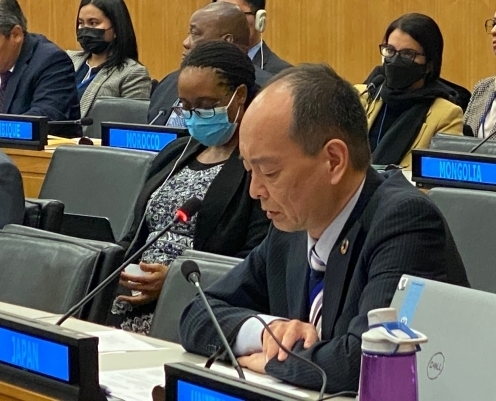第77回国連総会第二委員会一般討論演説における山中大使ステートメント
令和4年10月4日

(As delivered)
Madam Chair,
First of all I wish to congratulate you, Ambassador Stoeva and other Bureau members on your appointments. I also wish to thank Ambassador Frazier and the previous Bureau members for their excellent work.
As the impact of COVID-19 is gradually diminishing, we are glad that we will have full-fledged and in-person consultations for the first time in three years. Japan will engage constructively in the important discussions of this Committee.
Madam Chair,
The COVID-19 pandemic, climate change, violent conflict and use of coercion, food and energy insecurity, and rising inflation, among other challenges, are posing serious threats to people’s survival and livelihoods. We should embrace human security as a guiding principle of our actions to overcome these challenges by enhancing the resilience of individuals, societies and nations, and to achieve the Sustainable Development Goals (SDGs). Key enablers of our collective actions are the solidarity and trust among people, underpinned by the agency of individuals to act independently and make their own free choices. From this point of view, Japan continues to work with the UN to deepen the discussion on human security in the new era of multifaceted uncertainty.
Madam Chair,
Let me touch upon Japan’s policies on several specific issues.
First, COVID-19 has exposed vulnerabilities and inequalities in health system throughout the world. In the fight against COVID-19, Japan has been providing approximately 5 billion dollars to support low- and middle-income countries. Japan aims to ensure equitable access to vaccines, including by providing up to 1.5 billion dollars of financial support to the COVAX facility. We should also seize the momentum of the COVID-19 response to promote universal health coverage (UHC). Japan recently announced a pledge to contribute up to 1.08 billion dollars over the next three years to the Global Fund, to fight against HIV, TB and Malaria, and to strengthen health systems, which will beef up prevention, preparedness, and response (PPR) for future health crises.
Second, education is our priority area as a key enabler to achieve all SDGs and a foundation for lasting peace. The Transforming Education Summit produced fruitful results in response to the global crisis in education. Prime Minister of Japan, Mr. Kishida Fumio is determined to invest more in people and announced that he would assume the role of “Education Champion” to further strengthen ongoing efforts in this sector. Japan will also promote Education for Sustainable Development (ESD) as an integral element of the SDGs on quality education in order to equip learners with necessary knowledge, skills, values and attitudes to cope with the rapidly changing world.
Third, disaster risk reduction (DRR) should be mainstreamed throughout the sustainable development agenda. Japan continues to place utmost emphasis on the implementation of the Sendai Framework for Disaster Risk Reduction. The mid-term review of the Sendai Framework, as well as the High-Level Meeting to be held here in New York in 2023, will be important opportunities to promote disaster preparedness and the concept of "Build Back Better".
Fourth, financing for development is critical to achieving sustainable and inclusive growth. Japan hopes to deepen the discussions on how to enhance the debt transparency and sustainability and to mobilize private resources to tackle ongoing and emerging global challenges. We should ensure that the development finance effectively contributes, albeit indirectly, to the promotion of human security and the welfare of those people most in need.
Fifth, digital cooperation and innovation are key to achieving the SDGs. Through this Committee, Japan aims to discuss the importance of digital cooperation and inclusive and credible science, technology, and innovation for the promotion of sustainable development. Japan is keen to work closely with Mr. Amandeep Singh Gill, Envoy on Technology, and his office in the consultations on the development of the Global Digital Compact. We look forward to discussing digital issues at the G7 and the Internet Governance Forum to be held in Japan next year.
Sixth, Japan remains steadfastly committed to take action to tackle climate change, by reaching net-zero emission by 2050. We continue to play a leading role in promoting decarbonization and enhancing the resilience of the international community. Japan is determined to show leadership toward the success of COP27 and beyond.
Last but not least, Japan will also tackle food and energy insecurity (aggravated by Russia’s aggression against Ukraine) in cooperation with the UN.
Madam Chair,
Before concluding, I would like to reiterate our longstanding position on matters pertaining to this and other main Committees:
- First, the limited resources of the UN should be used effectively and efficiently in accordance with the priority given by the Member States. Strict scrutiny of program budget implications in all draft resolutions is indispensable.
- Second, as we will have a full-fledged and in-person session for the first time in three years, we hope to have a serious discussion on the revitalization of this Committee.
- And finally, Japan looks forward to engaging in constructive discussions with a view to making tangible progress towards our common goal of achieving the 2030 Agenda.
I thank you, Madam.
